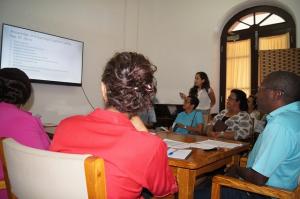Seychelles uses WHO tools to assess Health Service Availability and Readiness and Quality and Safety of Health care
Using tools developed by the World Health Organisation (WHO), the Ministry of Health (MoH), Seychelles has recently conducted two surveys to generate evidence for future planning and managing of its health system. The two surveys conducted in the country are the Service Availability and Readiness Assessment (SARA) and the Patient Safety Situational Analysis (PSSA).
With the technical support of WHO, both surveys were conducted on 25 sampled health facilities on the islands of Mahe, Praslin and La Digue, inclusive of both the public and private health centres. Following an initial support on administration of the tools earlier in the year, three of the WHO consultants were back in the country recently to assist with the analysis and validation of the survey findings.
SARA is an assessment tool designed to assess and monitor the service availability and readiness of the health facility to provide basic health-care interventions. The PSSA tool, on the other hand, serves as a robust data collection instrument for evaluating twelve action areas on the level of risk a patient is exposed to during the process of accessing health care. Data for both surveys were collected from interviewing key persons from various health facilities over a period of six weeks and the WHO mission team did the analysis and validation of findings.
The debriefing session held on May 12th at the MoH Headquarters was attended by a large group of professionals from the Ministry of Health (MoH) and WHO including the Principal Secretary for Health Dr. Bernard Valentin, Chief Executive Officer of the Health Care Agency Dr. Danny Louange and WHO Liaison Officer for Seychelles Dr. Bhupinder Aulakh. The Ministry of Health’s focal point for the surveys, Dr. Emelyn Shroff provided a snapshot of the processes undertaken by the country to gather the data and summarized the key findings of SARA and PSSA. Overall, the findings of the SARA suggest that the country has the capacity to deliver the services it offers and scored above targets for all of the components assessed. For instance, the country scored 29 for in-patient bed density per 10,000 population (target 25) and 23 for maternity bed density (target 10).
In terms of general service readiness, the country scored high in basic equipment, standard precautions and basic amenities but scored significantly lower in the diagnostics component. Trainings of staff in NCD conditions like Diabetes and Cardio-vascular diseases was another weak area identified for further strengthening. In PSSA, the survey has found that the country has performed better in areas of health care waste management and health worker protection, whereas the area that scored minimum was with regards to patient safety surveillance and research.
Dr. Shroff highlighted the limitations of the survey tools for example the tool focuses more on the facility’s readiness to provide health-care interventions for Communicable Diseases whilst the Seychelles burden of diseases is more of Non–Communicable diseases. Another limitation is that the tools are designed to assess hospitals and not smaller health facilities but in the Seychelles context same tool was used on smaller health facilities.
Following various constructive exchanges of questions and answers between the MoH personnel and clarifications by the WHO team, there was a general consensus that the tools need to be adapted to the country’s need and the interpretation need take into consideration Seychelles mechanism of service delivery. Further validation of the findings of both surveys is expected to be conducted in the weeks to come.
“SARA is a new tool for the Ministry of Health. It has provided us with concrete data on the quality of the services we are offering to our clients. It has also opened our eyes to the areas where we are performing well and where we need to put in more effort. We thank WHO for that”, Principal Secretary for Health, Dr Bernard Valentin said in his concluding remarks.
Seychelles becomes one of the few African countries to use this latest tool developed by the WHO in joint collaboration with the United States Agency for International Development (USAID). The country now has some sound evidence to strengthen its health systems management.
________________________________________
For more information, please contact :
Doreen Hotive (Mrs), NPO/HIP Officer, Tel: (248) 4224795, Email: hotived [at] who.inttarget="_blank"




